|
|
|
Sort Order |
|
|
|
Items / Page
|
|
|
|
|
|
|
| Srl | Item |
| 1 |
ID:
149877


|
|
|
|
|
| Summary/Abstract |
Energy policy literature tends to emphasise the impact of taxation on energy preference. However, the present case concerning extremely low acceptance of diesel cars in Japan could not be explained by taxation. As a possible factor, the paper sheds light upon discourse around the energy policy. The policy aimed to characterise diesel technology as emitting particulate matter and nitrogen oxide (NOx). The paper contributes to extending the existing understanding of the role of public policy by embracing the linguistic interactions complemented by visualisation.
|
|
|
|
|
|
|
|
|
|
|
|
|
|
|
|
| 2 |
ID:
101377
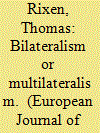

|
|
|
|
|
| Publication |
2010.
|
| Summary/Abstract |
Why do states cooperate bilaterally or multilaterally? This article addresses the issue using the example of international double tax avoidance. It is argued that double tax avoidance exhibits the strategic structure of a coordination game with a distributive conflict. The distribution of tax revenues depends on the asymmetry of investment flows between treaty partners. Since investment flows are defined dyadically, bilateral bargaining can best accommodate countries' concerns for the distribution of tax revenues and other economic benefits connected to the tax base. Moreover, because there are no serious externality problems with bilateral agreement, this solution is also viable. At the same time, there is a need for a multilateral organization to disseminate information and shared practices in the form of a model convention that provides a focal point for bilateral negotiations. This solution minimizes transaction costs. Since agreements are self-enforcing in coordination games there is no need for third-party enforcement. Instead, the Mutual Agreement Procedure (MAP) is a device to address problems of incomplete contracting.
|
|
|
|
|
|
|
|
|
|
|
|
|
|
|
|
| 3 |
ID:
130943
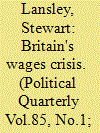

|
|
|
|
|
| Publication |
2014.
|
| Summary/Abstract |
Is 'predistribution' as championed by Ed Miliband, or old fashioned 'redistribution' as adopted, if stealthily, by Labour from 1997, the best way to create greater equality? Some critics have argued that a strategy of predistribution-aimed at closing the income gap before the application of taxes and benefits-would not work and that it will be necessary to rely mainly on redistribution. This article examines the potential impact of weak and more radical predistribution-style measures on one of the key drivers of inequality-'wage compression'. It examines the potential of a mix of policies for raising the wage floor. It argues that reliance on traditional redistribution would face its own set of constraints and that creating a more equal distribution of the cake, before taxes and benefits, is a necessary condition for lowering the risk of continuing economic crisis.
|
|
|
|
|
|
|
|
|
|
|
|
|
|
|
|
| 4 |
ID:
171445
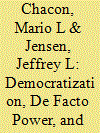

|
|
|
|
|
| Summary/Abstract |
How important is the enforcement of political rights in new democracies? The authors use the enfranchisement of the emancipated slaves following the American Civil War to study this question. Critical to their strategy, black suffrage was externally enforced by the United States Army in ten Southern states during Reconstruction. The authors employ a triple-difference model to estimate the joint effect of enfranchisement and its enforcement on taxation. They find that counties with greater black-population shares that were occupied by the military levied higher taxes compared to similar nonoccupied counties. These counties later experienced a comparatively greater decline in taxation after the troops were withdrawn. The authors also demonstrate that in occupied counties, black politicians were more likely to be elected and political murders by white supremacist groups occurred less frequently. The findings provide evidence on the key role of federal troops in limiting elite capture by force during this period.
|
|
|
|
|
|
|
|
|
|
|
|
|
|
|
|
| 5 |
ID:
166536
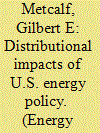

|
|
|
|
|
| Summary/Abstract |
This paper surveys energy policy in the United States from a distributional perspective. Focusing on the distributional impacts of energy taxes is too narrow a framework. The United States relies much more heavily on regulation than taxation to address energy-related market failures. It argues that most regulatory policies and tax subsidies to achieve energy policy goals are regressive. This includes fuel economy standards, EV purchase incentives, and energy efficiency tax incentives. In contrast, a carbon tax is likely to be progressive, even when ignoring the use of revenue. The view that carbon taxes are regressive stems from an incomplete distributional analysis that assumes all impacts arise from increases in the costs of consumer goods and services. Recent analyses have emphasized the importance of impacts on sources of income. In particular, a carbon tax is likely to reduce returns to capital more than wages. With capital disproportionately held by higher income households, this differential factor income effect is progressive. In addition, transfer income, more important for lower income households, tends to be indexed and so contributes to a carbon tax's progressivity. How carbon tax revenue is used can add even greater progressivity to a carbon tax reform.
|
|
|
|
|
|
|
|
|
|
|
|
|
|
|
|
| 6 |
ID:
133196
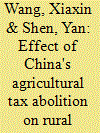

|
|
|
|
|
| Publication |
2014.
|
| Summary/Abstract |
This paper uses the rural household panel data collected by Research Center for Rural Economy to evaluate the impacts of China's agricultural tax abolition during 2004-2005 on farmers' income and production behavior. We find that the abolition of agricultural tax did not significantly affect agricultural production. The effects on input use and productivity are also found statistically insignificant. All these are consistent with the lump-sum property of the tax and imply little effect of the tax abolition on relaxing credit constraints to farmers. Finally, we find that the tax abolition did not increase farmers' net income significantly
|
|
|
|
|
|
|
|
|
|
|
|
|
|
|
|
| 7 |
ID:
092769


|
|
|
|
|
| Publication |
2009.
|
| Summary/Abstract |
The case for the imposition of carbon (emission) taxes or tradable carbon permits in important tax jurisdictions is arguably strong, based upon the polluter pays principle first proposed by Pigou almost a century ago. This paper briefly reviews the arguments for and against these market-based instruments, and discusses their relative advantages and disadvantages in a practical context. In the case of Australia, the revenue effect of the proposed tradable carbon permits scheme is estimated to be A$11.5 billion in 2010-11. For comparison, this is roughly equivalent to a quarter of the revenue from the Goods and Services Tax. The paper focuses on three neglected aspects of climate change taxation discussion to date: how much tax revenue is likely to be raised, and the administrative and compliance costs of an emissions trading scheme, with particular reference to Australia. In discussing these issues, the paper draws upon selected and relevant international experience, particularly the European Union emissions trading scheme. The challenges of an emissions trading scheme, including integration with the existing tax system, particularly in an Australian context, are also discussed. The paper concludes by emphasising the key challenges and issues facing this 'ultimate externality' debate, particularly from a taxation policy perspective.
|
|
|
|
|
|
|
|
|
|
|
|
|
|
|
|
| 8 |
ID:
126322
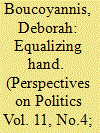

|
|
|
|
|
| Publication |
2013.
|
| Summary/Abstract |
That the market economy inevitably leads to inequality is widely accepted today, with disagreement confined to the desirability of redistributive action, its extent, and the role of government in the process. The canonical text of liberal political economy, Adam Smith's Wealth of Nations, is assumed even in the most progressive interpretations to accept inequality, rationalized as the inevitable trade-off for increasing prosperity compared to less developed but more equal economies. I argue instead that Smith's system, if fully implemented, would not allow steep inequalities to arise. In Smith, profits should be low and labor wages high, legislation in favor of the worker is "always just and equitable," land should be distributed widely and evenly, inheritance laws liberalized, taxation can be high if it is equitable, and the science of the legislator is necessary to put the system in motion and keep it aligned. Market economies are made in Smith's system. Political theorists and economists have highlighted some of these points, but the counterfactual "what would the distribution of wealth be if all the building blocks were ever in place?" has not been posed. Doing so encourages us to question why steep inequality is accepted as a fact, instead of a pathology that the market economy was not supposed to generate in the first place.
|
|
|
|
|
|
|
|
|
|
|
|
|
|
|
|
| 9 |
ID:
185604
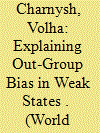

|
|
|
|
|
| Summary/Abstract |
Two dominant explanations for ethnic bias in distributional outcomes are electoral incentives and out-group prejudice. This article proposes a novel and complementary explanation for the phenomenon: variation in legibility across ethnic groups. The author argues that states will allocate fewer resources to groups from which they cannot gather accurate information or collect taxes. The argument is supported by original data on state aid from the 1891/1892 famine in the Russian Empire. Qualitative and quantitative analyses show that districts with a larger Muslim population experienced higher famine mortality and received less generous public assistance. The Muslims, historically ruled via religious intermediaries, were less legible to state officials and generated lower fiscal revenues. State officials could not count on the repayment of food loans or collect tax arrears from Muslim communes, so they were more likely to withhold aid. State relief did not vary with the presence of other minorities that were more legible and generated more revenue.
|
|
|
|
|
|
|
|
|
|
|
|
|
|
|
|
| 10 |
ID:
186938
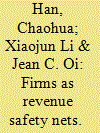

|
|
|
|
|
| Summary/Abstract |
The political connection between the state and firms in the context of China's corporate restructuring has been little explored. Using the clientelist framework and unpacking the incentives of both firms and the state, we analyse political connections as repeated patron–client exchanges where the politically connected firms can help the state fulfil its revenue imperative, serving as a failsafe for local authorities to ensure that upper-level tax quotas are met. Leveraging original surveys of the same Chinese firms over an 11-year period and the variations in their post-restructuring board composition, we find that restructured state-owned enterprises (SOEs) with political connections pay more tax than their assessed amount, independent of profits, in exchange for more preferential access to key inputs and policy opportunities controlled by the state. Examining taxes rather than profits also offers a new interpretation for why China continues to favour its remaining SOEs even when they are less profitable.
|
|
|
|
|
|
|
|
|
|
|
|
|
|
|
|
| 11 |
ID:
100996
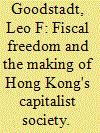

|
|
|
|
|
| Publication |
2010.
|
| Summary/Abstract |
Fiscal autonomy is a defining principle of China's arrangements for Hong Kong's postcolonial administration and was a major feature of British rule before 1997. This article begins with a discussion of how this colony achieved unusual freedom from London's usual oversight of colonial governments. After rejecting Colonial Office demands for a modern income tax, Hong Kong stuck to the principle of "low tax, small government," defying London's repeated calls for increased public expenditure on social development while resisting local business pressures for subsidies and tax concessions. The analysis then identifies fiscal freedom's contribution to Hong Kong's growth as an international financial center. The discussion explains the link between Hong Kong's unfashionable fiscal conservatism in the 1950s and 1960s and the buildup of government reserves to a level which permitted Hong Kong to control its own monetary affairs, including an independent currency. The final section assesses the gains and losses, both economic and social, which accompanied this fiscal independence. The analysis makes extensive use of unpublished archival material.
|
|
|
|
|
|
|
|
|
|
|
|
|
|
|
|
| 12 |
ID:
175257
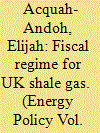

|
|
|
|
|
| Summary/Abstract |
The UK is believed to hold prolific reserves of shale gas; the quality of which has been compared and sometimes branded superior to the much successful US shale plays. Nonetheless, after more than ten years since the 13th Onshore Licensing Round, the fracking industry is said to have benefited from just £400 million - £500 million of estimated investments and only one partially fracked well with yet an uncertain fate of commercial production. This paradox motivated the current research. Based on a discounted cash flow model, the economic feasibility of the tax regime was evaluated with a special interest in the pad allowance [PA], a major incentive of the fiscal regime. We find that the design of the fiscal regime well achieves the Government's financial objectives, but fails to support shale gas investments at lower gas prices. PA introduces further variability in investor cash flows, ultimately defeating the ethos of the incentive. We propose a reduction in the overall tax rate from 40% to no more than 21%; a removal of the additional tax charge (Supplementary Charge) and an amendment of PA rules to; (1) allow an extension of RFES to PA; (2) permit transfer of activated PA across companies in the same group; and (3) redefine capital expenditure to include intermediate well retirement costs necessary to drill new wells to stimulate production. Such a tax strategy would simplify and align the UK fiscal regime with practices across the US, China, Algeria and Canada. Importantly, it would better match the risk of shale gas investments to its rewards and could better attract investments. We recommend the strategy for emerging unconventional oil and gas producing countries for an efficient design of their fiscal regimes.
|
|
|
|
|
|
|
|
|
|
|
|
|
|
|
|
| 13 |
ID:
086756
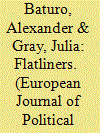

|
|
|
|
|
| Publication |
2009.
|
| Summary/Abstract |
What factors explain the wave of adoption of the flat tax in Eastern Europe? It is argued in this article that, once the first few successes were underway, governments with liberal outlooks toward taxation adopted the reform through a process of rational learning: an often radically new government will tend to adopt the policy based on successful implementation of its neighbours. The issue of policy diffusion is approached by explicitly modeling the different mechanisms that might underlie the process. Little evidence is found for pure 'bandwagoning' in the adoption of the flat tax - the presence of other market-minded reforms do not predict adoption of the flat tax, and contagion measures do not capture the dynamics of the adoption of the reform. Instead, rational learning, where economically right-wing governments evaluated the success of the reform (as measured by their ability to attract foreign investment) in the medium term, plays the largest role. Rational emulation in a shorter time period contributes to the probability of adoption as well, as does a change to an economically liberal ideology.
|
|
|
|
|
|
|
|
|
|
|
|
|
|
|
|
| 14 |
ID:
178726
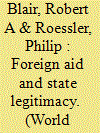

|
|
|
|
|
| Summary/Abstract |
What are the effects of foreign aid on the perceived legitimacy of recipient states? Different donors adhere to different rules, principles, and operating procedures. The authors theorize that variation in these aid regimes may generate variation in the effects of aid on state legitimacy. To test their theory, they compare aid from the United States to aid from China, its most prominent geopolitical rival. Their research design combines within-country analysis of original surveys, survey experiments, and behavioral games in Liberia with cross-country analysis of existing administrative and Afrobarometer data from six African countries. They exploit multiple proxies for state legitimacy, but focus in particular on tax compliance and morale. Contrary to expectations, the authors find little evidence to suggest that exposure to aid diminishes the legitimacy of African states. If anything, the opposite appears to be true. Their results are consistent across multiple settings, multiple levels of analysis, and multiple measurement and identification strategies, and are unlikely to be artifacts of sample selection, statistical power, or the strength or weakness of particular experimental treatments. The authors conclude that the effects of aid on state legitimacy at the microlevel are largely benign.
|
|
|
|
|
|
|
|
|
|
|
|
|
|
|
|
| 15 |
ID:
037190
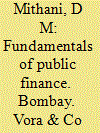

|
|
|
|
|
| Publication |
Bombay, Vora & Co Publishers, 1972.
|
| Description |
vi, 258p.
|
|
|
|
|
|
|
|
|
|
|
|
Copies: C:1/I:0,R:0,Q:0
Circulation
| Accession# | Call# | Current Location | Status | Policy | Location |
| 010071 | 336/MIT 010071 | Main | On Shelf | General | |
|
|
|
|
| 16 |
ID:
139266
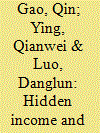

|
|
|
|
|
| Summary/Abstract |
Using a unique dataset based on a survey conducted by the Guangzhou Land Resources and Housing Administrative Bureau from November 2009 to January 2010, this article examines the sources and distribution of the hidden income of residents from different occupational backgrounds, taking into consideration their explicit income and other socio-economic characteristics. The results show that government officials not only had the highest but also the most stable hidden income, followed by employees in state-owned enterprises and employees in colleges or research institutions. Among government officials, those holding higher-level positions possessed more hidden income than those in lower-level positions. These findings have implications for China's labour market, taxation and resource allocation, and need to be taken into consideration in future economic and political policy designs and implementations.
|
|
|
|
|
|
|
|
|
|
|
|
|
|
|
|
| 17 |
ID:
196103


|
|
|
|
|
| Summary/Abstract |
How do states build their informational capacity? This article argues that distributive politics conditions how the state’s capacity develops. I study civil registration, where citizens comply with the state’s informational demands in exchange for documentary proof of identity, which may simultaneously facilitate access to public resources and exposure to taxation. Though the rich are particularly threatened by taxation, the narrow benefits of registration induce their compliance over that of the poor. I leverage a set of reforms in early postindependence Tanzania which provide quasi-random variation in citizens’ registration status and show that registration promotes access to narrow-based resources, rather than broad-based ones, while increasing tax payment. In turn, citizens’ decisions to comply reflect the economically stratified local incidence of these net benefits. The results suggest how nominally universal state-building schemes can have regressive effects on the state’s coverage.
|
|
|
|
|
|
|
|
|
|
|
|
|
|
|
|
| 18 |
ID:
099909
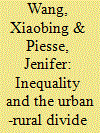

|
|
|
|
|
| Publication |
2010.
|
| Summary/Abstract |
Using three comparable national representative household surveys for China in 1988, 1995 and 2002, the present paper reveals the regressivity and urban bias of China's direct tax and welfare system in this period. It shows that a regressive taxation system and skewed allocation of subsidies increases the urban-rural income gap and enhances overall inequality. Modeling these relationships indicates that the relatively poorer rural population has a net tax liability, whereas those in the richer urban areas receive net subsidies. This pattern is common in China, although the extent of the bias varies. This skewed system of tax and welfare payments is a major cause of the persisting urban-rural income gap and contributes to the overall income inequality in China. The abolishment of the agriculture tax in 2006 has had a positive impact on rural people's livelihoods.
|
|
|
|
|
|
|
|
|
|
|
|
|
|
|
|
| 19 |
ID:
126787
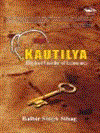

|
|
|
|
|
| Publication |
New Delhi, Vitasta Publishing Pvt Ltd, 2014.
|
| Description |
429p.Hbk
|
| Standard Number |
9788192535494
|
|
|
|
|
|
|
|
|
|
|
|
Copies: C:1/I:0,R:0,Q:0
Circulation
| Accession# | Call# | Current Location | Status | Policy | Location |
| 057566 | 330.150954/SIH 057566 | Main | On Shelf | General | |
|
|
|
|
| 20 |
ID:
127830
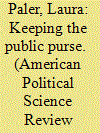

|
|
|
|
|
| Publication |
2013.
|
| Summary/Abstract |
It is widely believed that rents from windfall revenue undermine accountability. An enduring explanation is that windfalls free leaders from the need to tax, producing a quiescent population. Yet, there is little direct evidence of how windfalls and taxes affect citizen political action. I use novel revenue and information experiments to examine whether and why windfalls (compared to taxes) affect how citizens participate in politics. The experiments were embedded in a public awareness campaign conducted with 1,863 citizens in Indonesia. The results-from an original survey and postcard campaign-indicate that the tax treatment increased monitoring and anti-incumbent political action. Yet, when given spending information, citizens in the windfall treatment cared just as much about misused revenue as those in the tax treatment. The findings have important implications for understanding not only how revenue affects citizen political behavior but also how people acquire and process information on government spending
|
|
|
|
|
|
|
|
|
|
|
|
|
|
|
|
|
|
|
|
|